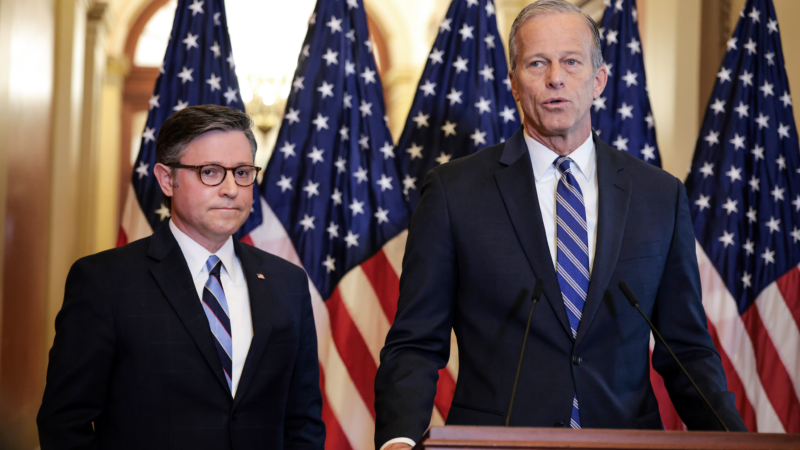As drinks targeting kids have soared, there’s new guidance on what’s healthy
Kids and teens should mostly stick to water and plain milk and avoid drinks with added sugar, artificial sweeteners and caffeine. That’s according to new recommendations from a coalition of health and nutrition organizations, which come as highly caffeinated energy drinks remain popular among teens.
The recommendations for kids and teens ages 5 to 18 are based on a review of the latest science and come from a collaboration of experts from the American Academy of Pediatrics, the Academy of Nutrition and Dietetics, the American Academy of Pediatric Dentistry and the American Heart Association.
Dr. Mark Corkins, chair of the AAP’s committee on nutrition, says the guidelines are necessary because “the data tells us that one of the main avenues for added sugar intake in kids is beverages.”
In recent years, there has been a proliferation of new beverages marketed to kids and teens, says Megan Lott, deputy director of Healthy Eating Research, a national program of the Robert Wood Johnson Foundation, which convened the expert panel.
These include blended coffees and energy drinks. Energy drinks have become quite popular among adolescents but often contain added sugars and large amounts of caffeine.
“New research has shown us that even small amounts of caffeine can cause delayed sleep, increased amounts of depressive moods and anxiety, and other mental health issues that are really problematic for young teens,” Lott says. There are also “case studies of kids and teens coming into ERs who had cardiac events as a result of too much caffeine.”
Some of the panel’s advice might surprise parents. For instance, while plant-based milks have also become popular, the expert group calls for kids and teens to limit their intake of these beverages unless they can’t drink cow’s milk because of allergies or other dietary restrictions. That’s because most plant-based milks don’t offer the same nutrition as cow’s milk, says Corkins.
“A lot of them have very little protein in them,” he says. “And somehow, people are giving them to their kids thinking they’re an alternative to cow’s milk.” But in terms of nutrition, he says many plant-based milks “aren’t even close,” so it’s important to read nutrition labels.
Lott notes that many plant-based milks have added sugars and don’t provide as much protein, vitamin D, calcium or riboflavin as cow’s milk. If parents are choosing these drinks for their kids, “it’s really important to work with a pediatrician or a dietitian to make sure those nutrient shortfalls are being met through other foods,” she says.
In a statement to NPR, Marjorie Mulhall, senior policy director for the Plant Based Foods Association, wrote, “We respectfully disagree with the premise that plant-based milks should be limited based on nutritional comparisons to cow’s milk” and that such comparisons oversimplify a complex topic.
“Some vitamins in conventional dairy milk are added through fortification, similar to how plant-based milks are fortified,” Mulhall said, adding, “Many plant-based milks offer excellent sources of protein, calcium, vitamin D, and other important nutrients that support children’s health and development.”
As for the advice to steer clear of artificially sweetened sodas and other drinks?
Lott says that there’s not much research on the health impacts of non-sugar sweeteners in children and adolescents. But emerging research in adults suggests these no-calorie sweeteners may not help with weight maintenance. She says this evidence also shows potential harmful effects of long-term use, including an increased risk of Type 2 diabetes and cardiovascular disease. Research also suggests artificial sweeteners could affect the gut microbiome.
“The reality is, there’s just a lot we don’t know about these,” Lott says. “And given that, the expert panel felt really strongly that kids and teens should avoid drinking them until we just know more about their long-term impacts.”
William Dermody, spokesperson for the American Beverage Association, points out that “low and no-calorie sweeteners have been deemed safe by regulatory bodies around the world.” In a written statement to NPR, he noted that “these sweeteners are a useful tool for helping people reduce sugar consumption and manage weight.” And he pointed to the beverage industry’s voluntary efforts to replace high-calorie beverages in schools through their National School Beverage Guidelines.
“When it comes to children, we support parents in making the choices that are best for their families,” Dermody wrote.
For parents looking for help making those choices, Lott, of Healthy Eating Research, says the new recommendations are “the gold standard based on the evidence.” Even swapping one sugary drink a day for water, “or reducing the level of caffeinated drinks each day, is positive for your child’s health in the long run,” Lott says.
This story was edited by Jane Greenhalgh.
Jillian Lauren: What we know about police shooting of Weezer bassist’s wife
Jillian Lauren suffered a non-life-threatening injury this week when police shot her in her yard after they say she pointed a gun at them. Details about the incident in Los Angeles are still emerging.
House approves budget framework, kickstarting work on Trump’s domestic agenda
House Republicans narrowly adopted a multitrillion dollar budget framework on Thursday, paving the way for lawmakers to begin work on many of President Trump's top policy priorities.
Where do tariffs stand? A look at what’s in place and what’s on pause
Trump announced a 90-day pause on most country-specific tariffs, but left other duties in place. Here's a look at where things stand and what could happen next.
Shark attack survivor presses Alabama for an alert system to keep people safe in the water
Lulu Gribbin was one of three people bitten by a shark during a string of attacks off the Florida Panhandle. On Wednesday, she asked Alabama lawmakers to support a proposed shark attack alert system.
Reflections after 43 years in an Alabama prison
James Jones is one of thousands of men who served life without parole in an Alabama prison. He spent 43 years at the St. Clair Correctional Facility before being released at the age of 77.
U.S. stocks slide again as euphoria over Trump’s tariff pause starts to fade
U.S. stocks fell a day after posting spectacular gains over President Trump's decision to pause many of his tariffs. Now, some of that relief is starting to fade.









